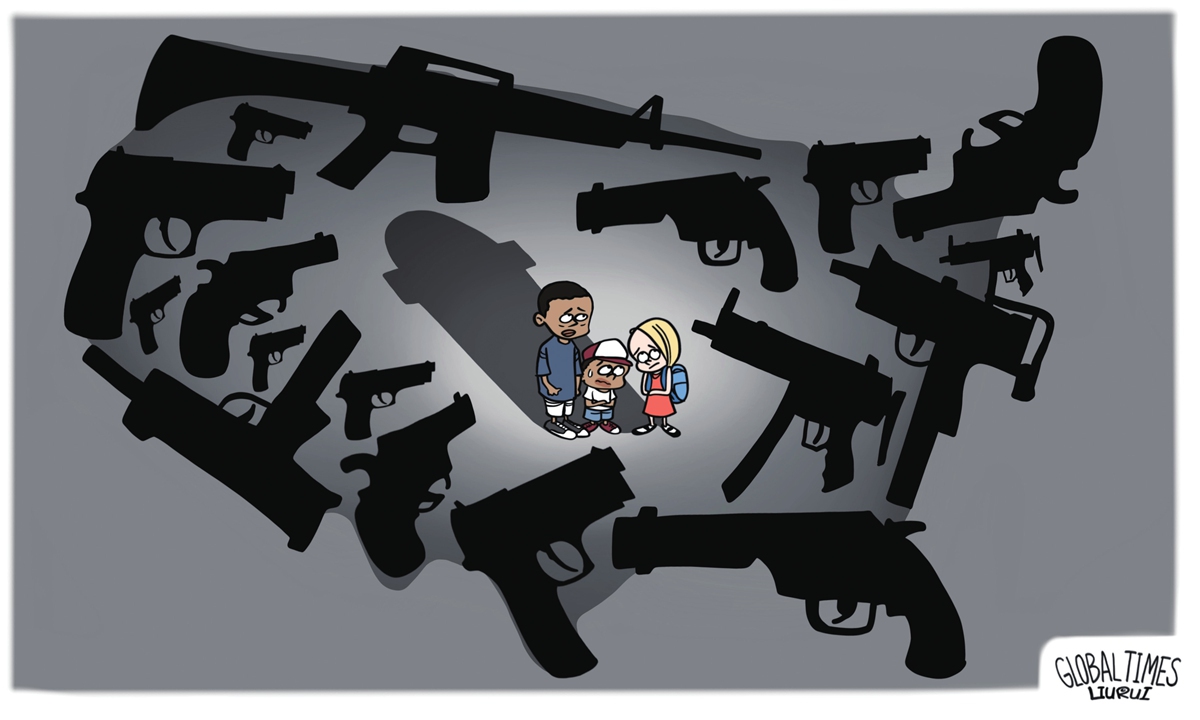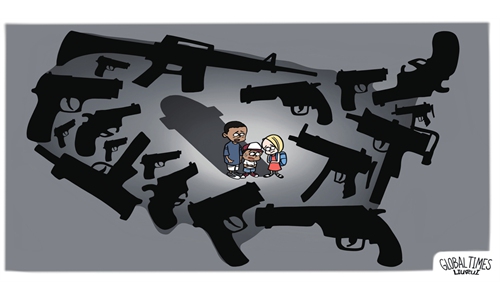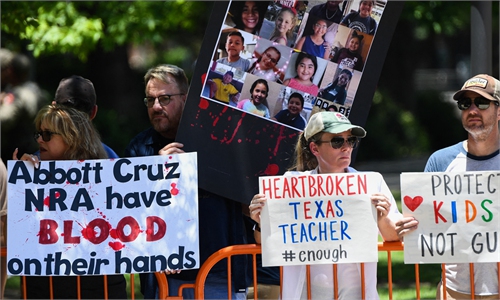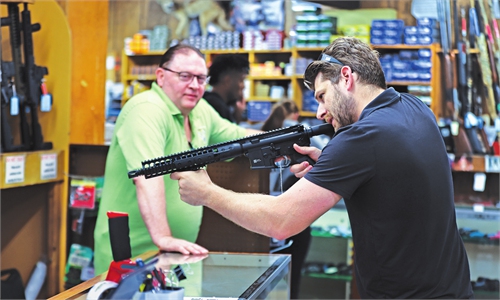
US gun violence Illustration: Liu Rui/GT
Three things happened in the US on Sunday — US President Joe Biden and first lady Jill Biden's trip to Uvalde, Texas to mourn the 19 children and two teachers slain in the mass shooting, a New York city stampede caused by a false report of an active shooter, and another shooting at a Memorial Day festival in Oklahoma which killed one and injured seven.
Observers noted a phenomenon in American society that every time there is a mass shooting, people express anger and grief, politicians vow changes, yet gun violence only grows and efforts supposed to tackle the problem always fail.
The visit to Uvalde was Biden's second trip in weeks to console a community in the shadows of a mass shooting. He traveled to Buffalo, New York, on May 17 to meet with victims' families and condemn white supremacy after a shooter espousing the racist "replacement theory" killed 10 black people at a supermarket, the Associated Press reported.
Gun Violence Archive, a nonprofit that tracks shootings in the US and defines a mass shooting as with four or more shot, has counted at least 214 mass shootings so far this year. The US ended 2021 with 693 mass shootings, according to the group. 2020 saw 611 and 2019 had 417.
Mckinzie Hinojosa, whose cousin was killed in the Texas shooting, said "It's more than mourning." "We want change. We want action. It continues to be something that happens over and over and over. A mass shooting happens. It's on the news. People cry. Then it's gone. Nobody cares. And then it happens again. And again," AP cited her as saying.
Also on Sunday, a crowd was leaving the Barclays Center in Brooklyn after a boxing match when a loud noise was heard, spooking people and causing many to start running in fear of a possible shooter. Ten were injured in the incident.
Public anger, grief and fear against gun violence unlikely yield changes in legislation or social governance, Wei Nanzhi, a research fellow with the Institute of American Studies at the Chinese Academy of Social Sciences in Beijing, told the Global Times.
Attitudes on gun control are not clear between the two parties and so many interests are intertwined where a bipartisan compromise to take substantial action against gun violence is almost impossible, said Diao Daming, an associate professor at the Renmin University of China.
Wei added that the separation of powers between states and the federal government, the political battles between the two parties at all levels, and the existence of a military-industrial complex make gun violence often discussed but never addressed.
Over the years, Biden has been intimately involved in the gun control movement's most notable successes, such as the 1994 assault weapons ban, and its most troubling disappointments, including the failure to pass new legislation after the 2012 massacre at Sandy Hook Elementary School in Newtown, Connecticut, the AP reported.
As president, Biden has tried to chip away at gun violence through executive orders, which might be the best the president can do, given Washington's sharp divisions on gun control legislation, according to the report.
Gun ownership, granted by the Second Amendment, has been reinforced by lobbyists as "the core right of being an American citizen," Diao told the Global Times on Monday.
Data shows that whenever there is a mass shooting, more Americans rush to buy guns.
FBI background checks for firearms — one measure for estimating fluctuations in gun sales across the country —increased after major mass shooting events and other unsettling news events, according to data released by the agency.
Where there are more guns, there are more gun deaths, a CNN analysis showed. Wider gun ownership leads to more gun deaths.
Many private arguments, with the presence of a gun owner, end up in gun deaths, observers said. The Sunday shooting at the Oklahoma festival was reportedly such a scenario and similar cases are common if one searches "shooting" and "arguments" together.
Political polarization, economic imbalance, society division, and racial conflicts jointly fueled gun violence, which has become an underlying disease of US society, Diao said. Whenever those social problems intensify, the symptom — gun violence — becomes acute.
Americans have to reconcile with such a vicious circle and the Texas shooting, among the deadliest in US history, and other similar tragedies. They have been so used to it and so disappointed with policymakers' ability to solve it that one incident will have little if any influence on the result of the upcoming mid-term elections, observers said.
Livelihood issues such as the economy, employment, welfare and health care are usually the major issues during the mid-term elections. Both parties will exploit the topic to attack political opponents but won't use it as a major leverage to woo voters, Diao said.
The political influence in the aftermath of a mass shooting tragedy, if any, could only be a slight sway in the vote percentage in the neighborhood in question, such as Uvalde this time, experts said.



